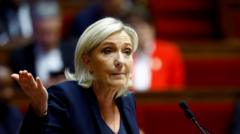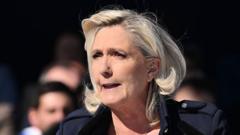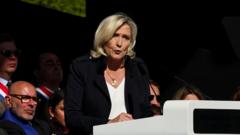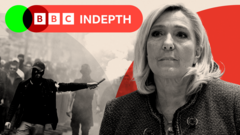With the potential impact on the National Rally and the 2027 presidential election still unclear, party dynamics are shifting as they plan their next steps in a post-Le Pen future.
**Marine Le Pen's Disqualification: A Pivotal Moment for French Far Right Politics**

**Marine Le Pen's Disqualification: A Pivotal Moment for French Far Right Politics**
Marine Le Pen's recent court ruling has sent shockwaves through France's political landscape, disqualifying her from office for five years due to embezzlement of EU funds.
The Paris courtroom echoed with disbelief today as Marine Le Pen, the head of the far-right National Rally party, reacted fiercely to her conviction. The verdict barred her from public office for five years, likely ending her ambitions for the 2027 presidential election. Le Pen left court with an incredulous expression and made a hasty exit before the details of her sentence were fully pronounced.
The ruling was unexpected, even by political opponents who generally see her as a formidable player in France’s political arena. Leaders across the spectrum, from leftist Jean-Luc Mélenchon to centrist Prime Minister François Bayrou, assumed that the court would not impose such a harsh sanction. They believed it would be politically unwise to disallow such a crucial figure from competition. However, Judge Bénédicte de Perthuis opted to enforce the law as it stood, which had recently been tightened by the same politicians now lamenting its application.
This unexpected ruling has left the National Rally in disarray. Party leaders convened an emergency meeting to discuss their next steps amidst uncertainty about Le Pen's future. Although she plans to appeal her conviction—which could potentially change the length of her ineligibility—there is little optimism about the outcome. Meanwhile, discussions have shifted to the possibility of appointing 29-year-old Jordan Bardella as the new face of the party's leadership and potential candidate for the presidency. However, not all party members may be on board with this change.
In the short term, the ruling may paradoxically rally more support for the National Rally, as its supporters frame Le Pen as a martyr facing unfair persecution. This leverage may help sustain their narrative against the establishment forces in French politics. However, the long-term implications pose a risk for the party, as Le Pen's unique persona has been a vital asset. Her departure from frontline politics could create a vacuum that others within the party, like former interior minister Bruno Retailleau, might rush to fill.
Another factor to consider is Le Pen's remaining influence as a member of the National Assembly, where she commands a sizeable bloc. It remains to be seen how Le Pen will wield this power. The prevailing sentiment at the National Rally post-verdict might steer toward a more aggressive, confrontational stance against the current government, potentially reshaping the political landscape in the process.
As the National Rally navigates the fallout from this landmark ruling, the question looms: Can they adapt successfully without their most recognizable figure, or will they falter under the new dynamics shaping France’s far-right politics?
The ruling was unexpected, even by political opponents who generally see her as a formidable player in France’s political arena. Leaders across the spectrum, from leftist Jean-Luc Mélenchon to centrist Prime Minister François Bayrou, assumed that the court would not impose such a harsh sanction. They believed it would be politically unwise to disallow such a crucial figure from competition. However, Judge Bénédicte de Perthuis opted to enforce the law as it stood, which had recently been tightened by the same politicians now lamenting its application.
This unexpected ruling has left the National Rally in disarray. Party leaders convened an emergency meeting to discuss their next steps amidst uncertainty about Le Pen's future. Although she plans to appeal her conviction—which could potentially change the length of her ineligibility—there is little optimism about the outcome. Meanwhile, discussions have shifted to the possibility of appointing 29-year-old Jordan Bardella as the new face of the party's leadership and potential candidate for the presidency. However, not all party members may be on board with this change.
In the short term, the ruling may paradoxically rally more support for the National Rally, as its supporters frame Le Pen as a martyr facing unfair persecution. This leverage may help sustain their narrative against the establishment forces in French politics. However, the long-term implications pose a risk for the party, as Le Pen's unique persona has been a vital asset. Her departure from frontline politics could create a vacuum that others within the party, like former interior minister Bruno Retailleau, might rush to fill.
Another factor to consider is Le Pen's remaining influence as a member of the National Assembly, where she commands a sizeable bloc. It remains to be seen how Le Pen will wield this power. The prevailing sentiment at the National Rally post-verdict might steer toward a more aggressive, confrontational stance against the current government, potentially reshaping the political landscape in the process.
As the National Rally navigates the fallout from this landmark ruling, the question looms: Can they adapt successfully without their most recognizable figure, or will they falter under the new dynamics shaping France’s far-right politics?




















